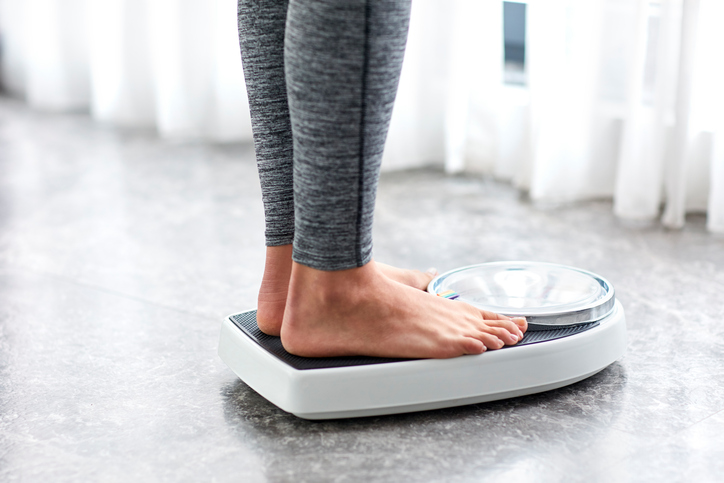

Young healthy girl on home scales
Around one in three Australians as young as 18 years of age have high cholesterol[1]. Here we explain how high cholesterol levels may cause health problems, now, and in the future.
Cholesterol is an essential part of our body, and at the correct levels, is necessary for helping to digest food, produce hormones and generate vitamin D[2]. Your body generates cholesterol itself, although we do ingest it from some foods[3]. There are two main types of cholesterol: low-density-lipoproteins (LDL), and high-density lipoproteins (HDL).
LDL and HDL cholesterol are divided into small and large components: the large components of LDL and HDL are useful for normal metabolism, whilst the small components may lead to fatty deposits developing in the artery wall. With the small LDL components, if there is too much of it circulating in the blood, it may cause plaque build up in the arteries, causing them to narrow and eventually get blocked. [4].
If you have an unhealthy diet and indulge in too many foods that are high in saturated fat, or processed and packaged foods, then your small, LDL levels may be too high. Weight may also be a factor in higher than normal cholesterol levels.
On the other hand, your body needs large, HDL cholesterol, as its role is to help redirect cholesterol from the arteries and remove excess from the cells, whereas small, HDL is pro-inflammatory.
A healthy change
Exercising regularly has been shown to help reduce cholesterol levels,[5][6] so aim for at least 30 minutes of moderate exercise a day. Also, diet is a key factor. Eating the following foods may help to decrease the bad components of cholesterol levels: oats, whole grains, beans, eggplant, nuts, olive oil, apples, grapes, strawberries and citrus fruits, salmon, tuna and sardines and fibre-rich foods[7].
Supplement your diet
If your cholesterol levels are high, your GP may have prescribed you statin medication. Around 2.2 million Australians take statins to control cholesterol levels[8], with some of them experiencing muscle pain as a side effect. Ubiquinol, an active form of the naturally-occurring antioxidant CoQ10, may help to reduce muscle pain by up to 54 per cent and muscle weakness by 44 per cent in those taking staitns[9]. Ubiquinol is more easily absorbed than CoQ10, and has been shown to help maintain a healthy heart and LDL cholesterol levels. Talk to your GP or local pharmacist for some advice on taking Ubiquinol.
Speak to your healthcare practitioner to find out which supplement is right for you. Always read the label. Use only as directed.
References
[1] http://www.abs.gov.au/ausstats/abs@.nsf/lookup/4812278BC4B8FE1ECA257BBB001217A4?opendocument
[2] http://www.abs.gov.au/ausstats/abs@.nsf/lookup/4812278BC4B8FE1ECA257BBB001217A4?opendocument
[3] https://www.heartfoundation.org.au/your-heart/know-your-risks/blood-cholesterol
[4] https://www.heartfoundation.org.au/your-heart/know-your-risks/heart-attack-risk-factors
[5] https://www.ncbi.nlm.nih.gov/pmc/articles/PMC3906547/
[6] https://www.ncbi.nlm.nih.gov/pubmed/12421890
[7] https://www.health.harvard.edu/heart-health/11-foods-that-lower-cholesterol
[8] https://www.heartfoundation.org.au/news/conclusive-statins-study-ends-fear-mongering
[9] https://www.ncbi.nlm.nih.gov/pubmed/23183519
A Multi-Modality Approach to Alleviating Monthly Symptoms Many women experience a range of challenging symptoms…
The APP 2025 Conference provided an exceptional platform for advancing pharmacy education. A standout session…
APP 2025 (20-22 March) - Gold Coast, Queensland 📅 Date: Friday 21 March 2025 ⏰…
How Kaneka Ubiquinol™ and Mitochondrial Function can Reduce Migraines Migraines affect 15% of the population,[1]…
Reflecting on a Successful FFWS 2025 and Our Award Win in the Healthy Ageing Ingredient Category…
Join us at FFWS 2025 Bangkok with Kaneka Ubiquinol™ to Discuss the Science Behind Healthy…